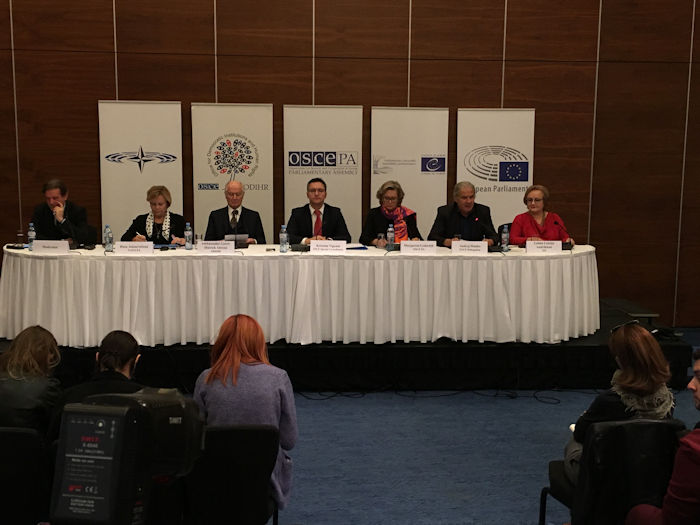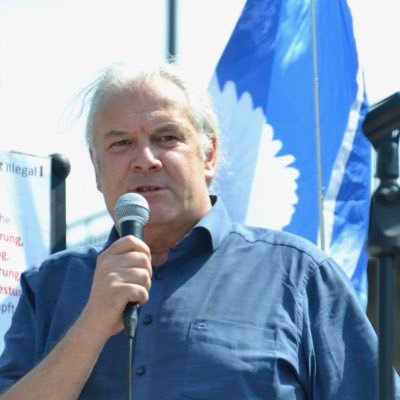
"Yesterday voting was well organized, and electors made their choice without restrictions,” said Andrej Hunko, Head of the delegation from the Parliamentary Assembly of the Council of Europe. “An astonishing amount of money has been spent in the electoral campaign – and this in a country with a high level of poverty. Another point of concern was the substantial number of candidates apparently campaigning on behalf of others, thus undermining the equality of opportunity and weakening the citizens’ confidence in the electoral process.”
Komplettes Pressestatement der Wahlbeoachtungsdelegationen von OSZE, Europarat, Nato und EP:
Voters had a genuine choice and candidates campaigned freely, but on an unlevel playing field, international observers say
Strasbourg, 29.10.2018 – Georgia’s 28 October presidential election was competitive and professionally administered. Candidates were able to campaign freely and voters had a genuine choice, although there were instances of the misuse of state resources, and the involvement of senior state officials from the ruling party in campaigning was not always in line with the law, the international observers concluded in a preliminary statement released today. A substantial imbalance in donations and excessively high spending limits further contributed to an unlevel playing field, the statement says.
While the public broadcasters provided all candidates with a platform to present their views, the sharp polarization of the private media and a lack of analytical reporting, along with negative campaigning and harsh rhetoric by participants, limited voters’ ability to make a fully informed choice, the observers said. Legal changes that increased the representation of the ruling party at all levels of the election administration and the insufficient transparency in the selection of non-partisan members of lower-level commissions undermined public perception of their impartiality.
“In this election, Georgia showed the maturity of its democracy. This further raises expectations. Therefore, while praising the achievements, it is important to be aware of the shortcomings related to the campaign environment, finances and the legal environment in general,” said Kristian Vigenin, Special Co-ordinator and leader of the short-term OSCE observer mission. “We hope that the Georgian people will actively participate in the second round and that the outcome will fully reflect their will.”
While fundamental freedoms were generally respected and contestants were able to campaign freely, several campaign events were disrupted and some party offices or campaign materials were vandalized. The campaign was dominated by polarizing topics, negative campaigning and harsh accusations between the ruling and one of the opposition parties.
“Yesterday voting was well organized, and electors made their choice without restrictions,” said Andrej Hunko, Head of the delegation from the Parliamentary Assembly of the Council of Europe. “An astonishing amount of money has been spent in the electoral campaign – and this in a country with a high level of poverty. Another point of concern was the substantial number of candidates apparently campaigning on behalf of others, thus undermining the equality of opportunity and weakening the citizens’ confidence in the electoral process.”
Margareta Cederfelt, Head of the delegation from the OSCE Parliamentary Assembly, said: “With yesterday’s vote, Georgia proved that efforts are being made to improve its electoral process. I encourage all election stakeholders, and especially the media and civil society, to exercise the highest level of professional ethics, particularly during the campaign for the second round. I would like to commend the Georgian people, and the youth in particular, for once more showing their great commitment to democracy.”
Concerns were raised about the collection of voters’ personal data by the ruling party, and pressure associated with this practice was observed on election day. Voting was assessed positively, despite some procedural issues during counting and the fact that many citizen observers and media representatives acted on behalf of political parties.
Representatives of candidates and from citizen and international organizations are allowed to observe the entire electoral process, and accreditation was inclusive and professionally managed. During the pre-election period there were intense verbal attacks on the work and representatives of citizen observer groups by high ranking members of the ruling party and senior public officials. Nonetheless, the observation efforts of over 70 citizen observer organizations contributed to the transparency of the process.
“We welcome the competitive nature of the election and the high level of engagement by independent civil society organizations, but are concerned that some of these were targeted by verbal attacks by senior state office holders,” said Laima Andrikienė, Head of the delegation from the European Parliament. “We also regret that Russia’s occupation of South Ossetia and Abkhazia, and the decision by the de facto local authorities to close the administrative border line with South Ossetia for the elections deprived many Georgian citizens from casting their ballots.”
A total of 25 candidates – 16 from political parties and 9 as independents – were registered in a process that was transparent and inclusive. Voter data were available for purchase, and there was no effective mechanism for checking the authenticity of support signatures. It became clear during the campaign that a significant number of candidates had registered so they could use public funding and free airtime to support other contestants, giving those an unfair advantage.
“Georgia is a positive example of reform, and a leader in Euro-Atlantic integration. Yesterday, I was impressed to see many citizens determined to exercise their democratic right,” said Rasa Juknevičienė, Head of the delegation from the NATO Parliamentary Assembly. “But these elections show that, without strong safeguards, the concentration of power and resources can be a risk for democracy.”
Positively both public national broadcasters decided to offer all candidates the same amount of free airtime and hosted numerous debates in which they could present their views. The media regulator was not always transparent and impartial when intervening in the campaign. Media monitoring results showed clear bias in private media coverage.
“The visible commitment shown by the voters should not be undermined by campaigning members of the political class. Unfortunately, we witnessed sharp confrontation, gross exaggerations, negative campaigning and personal insults,” said Ambassador Geert-Hinrich Ahrens, Head of the election observation mission from the OSCE Office for Democratic Institutions and Human Rights. “If there is a second round, the ODIHR election observation mission will remain here to observe.”
The legal framework provides an adequate basis for democratic elections. Although amendments to the election code in 2017 and 2018 introduced technical improvements, certain shortcomings remain, and recent amendments were a missed opportunity to address other prior ODIHR and Council of Europe recommendations and eliminate gaps and inconsistencies, the statement says.
Party and campaign finance legislation lacks uniformity, and recent legislative amendments did not address longstanding recommendations by ODIHR and the Council of Europe’s GRECO. The lack of regulation for obtaining loans for campaign expenses and reporting on the use of these funds potentially contributes to an imbalanced playing field. While the State Audit Office verified and promptly published reports before the election, the lack of clear deadlines for addressing violations and the institution’s insufficient resources raised concerns about the effectiveness of campaign finance oversight.

